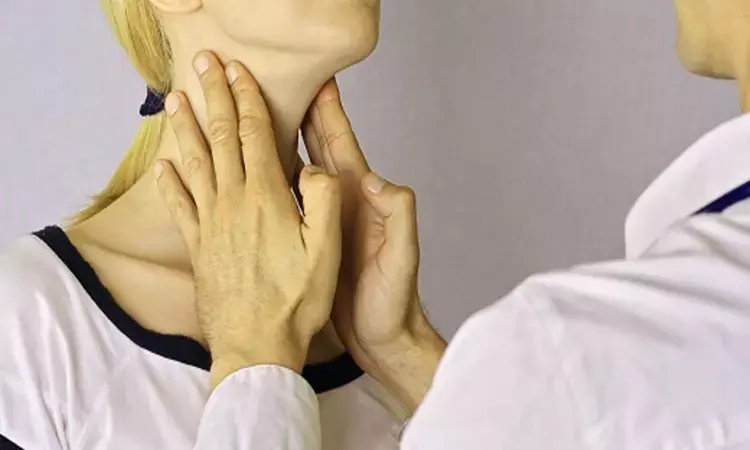- Home
- Medical news & Guidelines
- Anesthesiology
- Cardiology and CTVS
- Critical Care
- Dentistry
- Dermatology
- Diabetes and Endocrinology
- ENT
- Gastroenterology
- Medicine
- Nephrology
- Neurology
- Obstretics-Gynaecology
- Oncology
- Ophthalmology
- Orthopaedics
- Pediatrics-Neonatology
- Psychiatry
- Pulmonology
- Radiology
- Surgery
- Urology
- Laboratory Medicine
- Diet
- Nursing
- Paramedical
- Physiotherapy
- Health news
- Fact Check
- Bone Health Fact Check
- Brain Health Fact Check
- Cancer Related Fact Check
- Child Care Fact Check
- Dental and oral health fact check
- Diabetes and metabolic health fact check
- Diet and Nutrition Fact Check
- Eye and ENT Care Fact Check
- Fitness fact check
- Gut health fact check
- Heart health fact check
- Kidney health fact check
- Medical education fact check
- Men's health fact check
- Respiratory fact check
- Skin and hair care fact check
- Vaccine and Immunization fact check
- Women's health fact check
- AYUSH
- State News
- Andaman and Nicobar Islands
- Andhra Pradesh
- Arunachal Pradesh
- Assam
- Bihar
- Chandigarh
- Chattisgarh
- Dadra and Nagar Haveli
- Daman and Diu
- Delhi
- Goa
- Gujarat
- Haryana
- Himachal Pradesh
- Jammu & Kashmir
- Jharkhand
- Karnataka
- Kerala
- Ladakh
- Lakshadweep
- Madhya Pradesh
- Maharashtra
- Manipur
- Meghalaya
- Mizoram
- Nagaland
- Odisha
- Puducherry
- Punjab
- Rajasthan
- Sikkim
- Tamil Nadu
- Telangana
- Tripura
- Uttar Pradesh
- Uttrakhand
- West Bengal
- Medical Education
- Industry
Women with miscarriage at higher risk for subclinical hypothyroidism

UK: Women with a history of miscarriage or subfertility are at a higher risk for subclinical hypothyroidism, according to a recent study in the Journal of Clinical Endocrinology & Metabolism. According to the study, the prevalence of subclinical hypothyroidism was about 20% when using a TSH cutoff of 2.5 mIU/L, in such women.
It remains uncertain whether asymptomatic patients be screened for mild subclinical hypothyroidism (SCH) or thyroid peroxidase antibodies (TPOAb). In the absence of evidence of benefit with LT4 [levothyroxine] treatment and possible suggestion of harm, whether screening should be performed at all in asymptomatic individuals remains questionable. There is a need for large randomized trials to establish if preconception LT4 treatment of mild SCH with or without TPOAb positivity is beneficial.
Subclinical hypothyroidism represents an early stage of thyroid dysfunction. It can lead to preterm birth, miscarriage, subfertility, perinatal mortality, and preeclampsia. Thyroid peroxidase antibodies also have been associated with adverse pregnancy outcomes, and their presence increases the risk of subclinical and overt thyroid disease in pregnancy
Rima K Dhillon-Smith, University of Birmingham, Birmingham, UK, and colleagues conducted the study to describe the prevalence of and factors associated with different thyroid dysfunction phenotypes in women who are asymptomatic preconception.
This observational cohort study was conducted in 49 hospitals across the United Kingdom between 2011 and 2016. It involved women aged 16 to 41years with a history of miscarriage or subfertility trying for a pregnancy. The main outcome measure was the rates of thyroid dysfunction.
Key findings of the study include:
- Thyroid function and thyroid peroxidase antibody (TPOAb) data were available for 19213 and 19237 women, respectively.
- The prevalence of abnormal thyroid function was 4.8%; euthyroidism was defined as levels of thyroid-stimulating hormone (TSH) of 0.44 to 4.50 mIU/L and free thyroxine (fT4) of 10 to 21 pmol/L.
- Overt hypothyroidism (TSH > 4.50 mIU/L, fT4 < 10 pmol/L) was present in 0.2% of women and overt hyperthyroidism (TSH < 0.44 mIU/L, fT4 > 21 pmol/L) was present in 0.3%.
- The prevalence of subclinical hypothyroidism (SCH) using an upper TSH concentration of 4.50 mIU/L was 2.4%.
- Lowering the upper TSH to 2.50 mIU/L resulted in higher rates of SCH, 19.9%.
- Multiple regression analyses showed increased odds of SCH (TSH > 4.50 mIU/L) with body mass index (BMI) ≥ 35.0 kg/m2 (adjusted odds ratio [aOR]) and Asian ethnicity (aOR 1.76), and increased odds of SCH (TSH ≥ 2.50 mIU/L) with subfertility (aOR 1.16).
- TPOAb positivity was prevalent in 9.5% of women.
"The prevalence of undiagnosed overt thyroid disease is low. SCH and TPOAb are common, particularly in women with higher BMI or of Asian ethnicity. A TSH cutoff of 2.50 mIU/L to define SCH results in a significant proportion of women potentially requiring levothyroxine treatment," wrote the authors.
The study, "The Prevalence of Thyroid Dysfunction and Autoimmunity in Women With History of Miscarriage or Subfertility," is published in the Journal of Clinical Endocrinology & Metabolism.
DOI: https://doi.org/10.1210/clinem/dgaa302
Dr Kamal Kant Kohli-MBBS, DTCD- a chest specialist with more than 30 years of practice and a flair for writing clinical articles, Dr Kamal Kant Kohli joined Medical Dialogues as a Chief Editor of Medical News. Besides writing articles, as an editor, he proofreads and verifies all the medical content published on Medical Dialogues including those coming from journals, studies,medical conferences,guidelines etc. Email: drkohli@medicaldialogues.in. Contact no. 011-43720751


